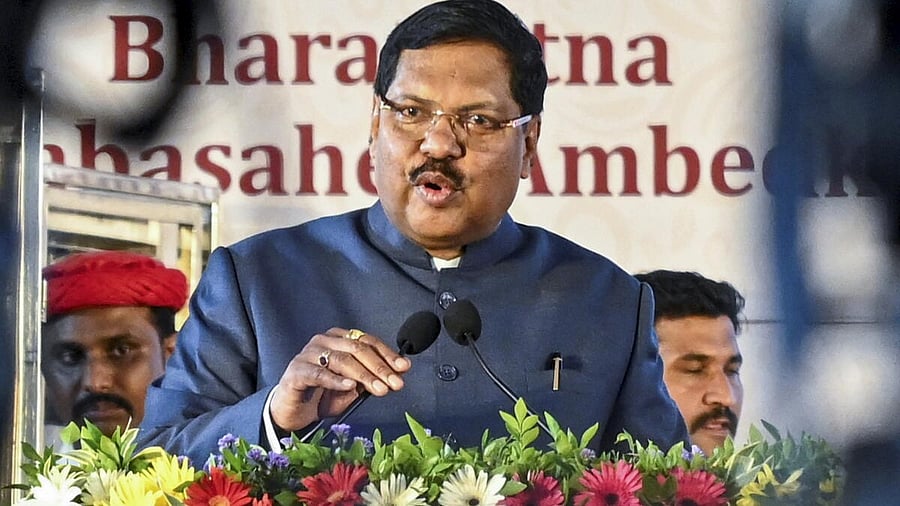
Chief Justice of India B.R. Gavai.
Credit: PTI File Photo
New Delhi: Chief Justice of India BR Gavai said on Saturday that the Supreme Court collegium cannot dictate a high court collegium to recommend a particular name for judgeship, emphasising both are constitutional courts and neither is superior to the other.
He was speaking at a function organised by the Supreme Court Bar Association (SCBA) to celebrate the 79th Independence Day, where SCBA president Vikas Singh urged the Supreme Court collegium to also consider lawyers practising in the apex court for judgeship in high courts, irrespective of the fact that they have not practised there.
CJI Gavai said, "Ultimately, even the Supreme Court Collegium can't dictate the high court collegium to recommend the names... the Supreme Court is not a superior court to the high court.
"Both the Supreme Court and the high court are constitutional court, and so far as the constitutional scheme is concerned, they are neither inferior nor superior to each other." Therefore, he said, the first call has to be taken by the high court collegium on the appointment of judges.
"We only recommend the names to the high court collegium and request them to consider the names, and only after their satisfaction that the candidates deserve the designation, the names come to the Supreme Court," the CJI said.
He said that when former chief justice Sanjiv Khanna was at the helm, the Supreme Court collegium started a practice of interacting with the candidates, and it has proved to be "really helpful".
CJI Gavai said that after interacting with the candidates for "10 minutes, 15 minutes or half an hour", the apex court collegium can find out as to how suitable they would be to contribute to society.
The CJI also remembered the freedom fighters and their struggle from Jharkhand's Santhal (Hul) rebellion of 1855 to Jyotirao Phule and Savitribai Phule in western Maharashtra. He recalled the words of Rabindranath Tagore, Mahatma Gandhi, BR Ambedkar and Maulana Abul Kalam Azad on the occasion.
He said that the country's history teaches the people that the struggle for freedom was not only a political moment, but also a moral and legal endeavour in which countless lawyers played a crucial role.
CJI Gavai said the legacy of freedom fighters must guide the lawyers of today and carry forward this tradition, to internalise the spirit of service, courage and commitment to justice that shaped the freedom struggle.
"As legal professionals, you must recognise that no cause is too small to merit your attention.
"What may appear to be a minor dispute or a trivial grievance to one, may in fact be a matter of life, dignity or survival for others. Every case you handle, every argument you advance, contributes to the moral and social fabric of our nation," he said.
The CJI said for judges, this responsibility carries on to an even deeper dimension beyond the letters of law and they must strive to give a broader, more purposeful interpretation to the values of the constitution.
"We must interpret the law in ways that expand freedom, protect the rights of the marginalised, and strengthen the rule of law. Only then will Tagore's prayer be answered, only then will Mahatma Gandhi's Swaraj be real, and only then will Dr Ambedkar’s idea of democracy be complete," he said.
The CJI said the freedom "was not forged in one place nor by one people, but by the courage of many speaking in different tongue".
"From the hills of today's Jharkhand, where the Santhals led the first plains of rebellion, to the forest of Chota Nagpur, where Birsa Munda dreamt of dignity for his people, from the school in Pune, where Mahatma Jyotiba Phule and Savitribai Phule opened the doors of learning to the excluded, to the renunciation of a knighthood by RabindranathTagore in protest against injustice; "From the careful counting of our constitution by Dr BR Ambedkar and his colleagues to the moral campus of Mahatma Gandhi… Our freedom was not forged in one place nor by one people, but by the courage of many speaking in different tongues, yet united by one dream of a prosperous and equal India," the CJI said.
Addressing the event where Union law minister Arjun Ram Meghwal and other apex court judges were also present, CJI Gavai said, it is the destiny of India that the Santhal community, which was amongst the first to rise against the British in 1855, now has its daughter, President Droupadi Murmu, holding the highest constitution office in the land." He said it's a journey from a small village in Odisha to Rashtrapati Bhavan which is a testament to how far the country has travelled and yet citizens must remember that the work of building a just, equal and inclusive India is far from complete.
"Let us pledge that the India we pass on will be one where no child is denied education because of his or her caste or out of poverty, no woman walks in fear by day or by night, and no citizen is too small to be heard; "No truth is too inconvenient to be spoken, although it is our solemn duty as judges and lawyers not merely to interpret and apply the law, but to actively uphold and embody the fundamental values enshrined in the Constitution we are entrusted with the responsibility to promote, protect, imbibe and defend the ideals of liberty, equality and fraternity, the very principles that form the bedrock of our democratic society," the CJI said.